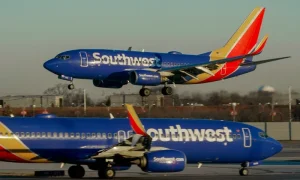In recent times, Southwest Airlines has experienced a series of flight disruptions that have caused significant inconvenience to passengers. Primarily, these disturbances stem from an amalgamation of issues including adverse weather conditions, internal operational challenges, and technological glitches. The airline has had to cancel and delay thousands of flights, leaving travelers stranded across various national terminals. This unfortunate situation has sparked outrage among customers due to the unexpected disruption of their travel plans. In response, Southwest Airlines has been striving to resolve these issues and restore normal operations.
The situation has highlighted the vulnerability of airline operations to unforeseen disruptions and the importance of robust contingency plans to minimize inconvenience to passengers. This incident has had a significant impact on the airline’s reputation, and the management has had to work assiduously to regain customer trust and ensure a smooth traveling experience for all. It is hoped that the lessons learned from this crisis will help the airline improve its operations and prevent similar disruptions in the future. It’s not just about ensuring that flights take off and land on time, but also about maintaining clear and transparent communication with passengers to manage their expectations during such crises.

Which Southwest Airlines Flights in Florida Were Canceled on Thursday?
On a particular Thursday, a significant number of Southwest Airlines flights in Florida were canceled, causing a major disruption to the travel plans of thousands of passengers. The cities severely affected included Miami, Tampa, and Orlando among others. The abrupt cancellation was attributed to several factors, primarily operational challenges and weather-related problems. According to the airline’s spokesperson, the operational challenges included unexpected maintenance issues that led to a shortage of aircraft. On the other hand, the weather-related problems referred to the extreme weather conditions that hit parts of Florida, making it unsafe for flights to take off or land.
The decision to cancel the flights, although inconvenient, was the safest and most prudent action to ensure passenger safety. The sudden cancellations led to a surge in customer complaints, with many passengers expressing their dissatisfaction and frustration on social media. Southwest Airlines, in response, apologized for the inconvenience and assured passengers that it was doing everything possible to rectify the situation. It also offered affected passengers the option to rebook their flights or receive refunds. Despite the airline’s efforts to manage the situation, the incident caused significant losses for the airline and greatly inconvenienced its customers. It also prompted calls for a thorough review of Southwest Airlines’ operational processes to prevent such occurrences in the future.
Are There Any Delays for Southwest Airlines Flights This Morning?
As of the current moment, Southwest Airlines has not reported any significant delays for their flight operations this morning. The airlines have been maintaining an excellent track record for punctuality and efficiency, striving to ensure that their flights depart and arrive as scheduled. Although occasional delays may occur due to unforeseen circumstances such as adverse weather conditions or technical issues with the aircraft, these instances are generally the exception rather than the rule. Southwest Airlines has always been committed to providing reliable service to their passengers, making every effort to minimize disruptions to their travel plans. Travelers are always advised to check the latest flight status on Southwest Airlines’ official website or mobile app before heading to the airport.

This gives them real-time information about their flight, enabling them to make appropriate arrangements if there are any changes to their flight schedule. It’s also beneficial to sign up for flight status notifications through email or text message, which provide timely updates about any potential delays or cancellations. Despite all these measures, it’s still important for passengers to arrive at the airport well in advance of their flight departure time. This not only allows for ample time to check in and go through security, but also provides a buffer in case of unexpected delays. Even with the most stringent operational procedures in place, delays can still occur and being prepared can help alleviate the stress that comes along with them. Overall, Southwest Airlines continues to uphold its commitment to timely service, ensuring that any potential delays are dealt with swiftly and effectively.
How the Southwest Airlines Computer Outage Impacted Flights on Wednesday, May 29
On Wednesday, May 29, a significant computer outage at Southwest Airlines caused a major disruption in flight operations, impacting thousands of passengers across the United States. The technical glitch, which lasted for several hours, resulted in a temporary ground stop for all of the airline’s flights, causing widespread delays and cancellations. As the system outage persisted, the airline was forced to manually check-in passengers, leading to long lines at airport counters. The domino effect of the outage extended beyond the day, as many passengers had to reschedule their flights, causing subsequent delays and cancellations in the days following the incident.
The incident was a stark reminder of the dependency of modern airlines on complex computer systems for their day-to-day operations. It underlined the significance of robust IT infrastructure and effective contingency plans in ensuring seamless operations and minimizing disruption for passengers. The airline issued an apology and assured its customers that it was working tirelessly to restore operations and accommodate affected passengers. Despite these efforts, the incident left a significant number of passengers frustrated and inconvenienced, highlighting the far-reaching effects that a single technical issue can have on an airline’s operations and its customers.
